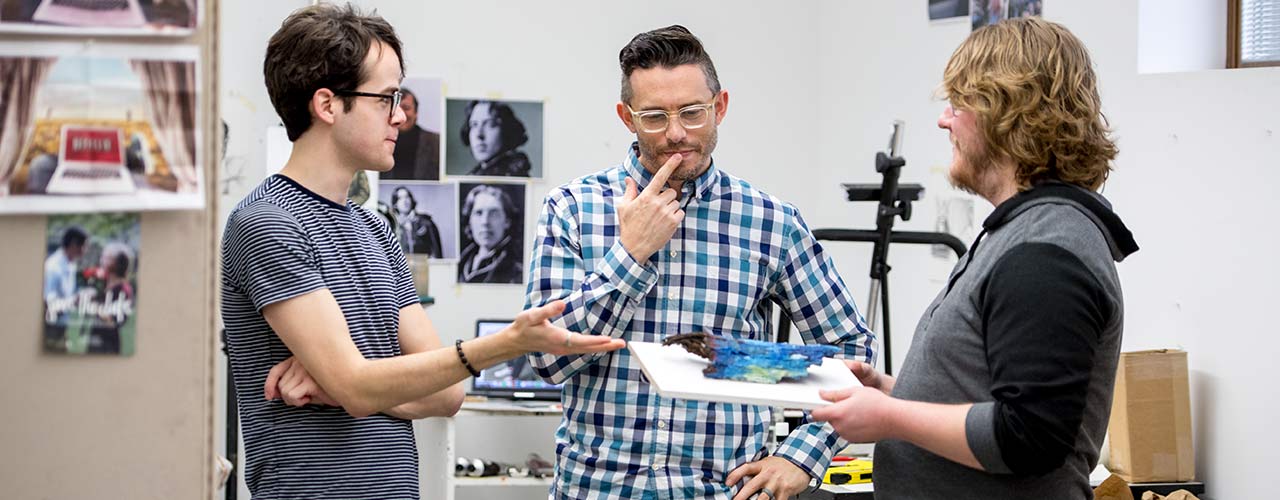
About Us
Mission Statement
The Cedarville University Department of Art, Design, and Theatre is an essential part of a unique, creative, and academic Christ-centered learning community that values a broad study of disciplines in the liberal arts. As Christian artists, we are given the gift of creativity to imitate and honor God as Creator. The Department of Art, Design, and Theatre believes that God has called us to excellence and whatever we do is to the glory and honor of the Creator. We believe that art is a gift and a calling, and that educational success in art, design, or theatre is not measured in income or job placement alone but in how lives are enabled, enriched, enlightened, and transformed. The successful graduate of the Department of Art, Design, and Theatre will:
- Glorify God: Demonstrate the appreciation of God’s purpose and design in creation through artistic endeavor.
The graduate will exercise the stewardship of God’s gifts as evidenced in a work ethic centered in faith and characterized by diligence, excellence, and honesty.
- Think broadly and deeply: Use critical thinking to evaluate and apply historical and cultural knowledge to conceptualize, create, and communicate their art.
- Communicate effectively: Be effective with verbal and visual communication while articulating a biblical philosophy of art which reveals an understanding of the integration of faith and learning.
- Develop academically and professionally: Demonstrate the understanding and competence of technical skills and media necessary for individual creation of visual or performing art. Graduates will be prepared for graduate study and/or become practitioners in their discipline.
- Engage for Christ: Be effective as a spiritual witness to the greater culture simply by being the best artist they can be. The graduate is engaged and involved in creating a viable cultural contribution to the artistic cultures of the University and community. By their humility, intellect, and excellent verbal and visual abilities, they impact the world for Christ.
Program Objectives
Industrial and Innovative Design
- Demonstrate a mastery of “systems design” principles including, but not limited to, sustainable design practices.
- Create a market relevant professional portfolio.
- Articulate and demonstrate an understanding of real-world best practices in industry-relevant terms and application.
- Professionally articulate and put into practice the fundamental processes and principles of “design thinking” (divergent and convergent thinking, ideation process mapping, multiple learned and acquired “thinking methodologies – logical, natural order, emotive, etc.)
- Demonstrate an understanding of entrepreneurialism as it relates to the business of design, product improvement, and product invention.
Studio Art
- Demonstrate creativity, technical proficiency, and diligence essential to art making.
- Articulate a personal philosophy of visual art that reveals an understanding of the integration of faith and learning.
- Apply knowledge of the relationship between art and culture through the making and discourse of art.
- Critique and evaluate the quality and worth of personal art and the art of others.
- Participate in exhibitions that contribute to the artistic cultures of the University and the community.
Theatre
- Demonstrate proficiency through capstone projects, writing, performances, design work and theatre technology.
- Critically evaluate information and aesthetic principles to express ideas creatively and professionally.
- Analyze problems and work to solve them in ways consistent with professional standards.
- Demonstrate knowledge of ethical leadership and a Christian worldview within the arts community.
Visual Communication Design
- Demonstrate effective communication skills related to the evaluation and critique of visual design.
- Apply technical knowledge and skills in creating design solutions.
- Integrate awareness of historical and cultural context to create effective visual design solutions.
- Demonstrate professional-level skills, knowledge, and creativity to successfully pursue, and excel in an entry level position in a related field.
- Demonstrate the integrity and ethics of a Biblical worldview through the practice and completion of creative and professional work.

















